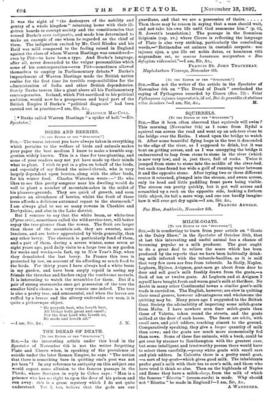MMCH-GOATS.
[TO THE EDITOR OF THE "SPECTATOR.") SIR,—It is comforting to learn from your article on " Goats at the Dairy Show," in the Spectator of October 30th, that at last this interesting and useful animal has a chance of becoming popular as a milk producer. The goat ought to do a great deal to relieve the scare which has been produced by the reports that we have been habitually drink- ing milk infected with the tubercle-bacillus, as it is said that very few cows are free from tubercle. In Sicily, Naples, Leghorn, Hyeres, Avignon, goat-men go about from door to door and sell goat's milk freshly drawn from the goats,—a flock of ten or twelve goats. At Leghorn and at Avignon r myself have bought fresh and warm goat's milk at the!door. No doubt in many other Continental towns a similar goat's-milk trade is carried on. The English, however, are slow in quitting their usual groove, however advantageous and wholesome the quitting may be. Many years ago I suggested to the British Goat Society the advisability of importing some milch-goats from Malta. I have nowhere seen finer milch-goats than those of Valetta, taken round the streets, and the goats milked at the door of each house. The finest are white, with small ears, and pink udders, reaching almost to the ground. Comparatively speaking, they give a larger quantity of milk than cows ; and the goats are much more economically fed. than cows. Some of these fine animals, with a buck, could be got over by steamer to Southampton with the greatest ease, but some intelligent and trustworthy person there would have to select them carefully,—young white goats with small ears and pink udders. In Calcutta there is a pretty small goat, —a sort of toy-goat—which gives good milk. The inhabitants prefer goat's milk with their tea to cow's milk, and those who have tried it think so also. Then on the highlands of Naples and Rome they have a milch-sheep, from the milk of which the famous " Ricotta " (cream-curds) is made. Why should not "Ricotta" be made in England P—I am, Sir, &c.,
A WANDERER.






































 Previous page
Previous page